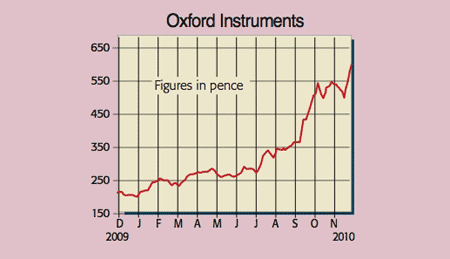
Oxford Instruments’ stock has rocketed five-fold since March 2009. It was among the first technology firms to be spun out of Oxford University. After withdrawing from unprofitable areas, it has since designed a host of useful precision instruments for commercial use. These include coating thickness analysers, X-ray tubes and nuclear polarisation devices.
It’s now making money from its academic prowess in sectors such as superconductors and nanotechnology. It sells to industrial and research bodies, and said in November that it had had an “excellent” first half – a £127.2m order backlog and turnover jumping 22% to £113.2m. Chinese sales rose 52%, while the industrial products division expanded 40% to £43.3m. And not to be outdone, the nano/plasma arm delivered a robust 13% leap to £49.2m. Chairman Nigel Keen adds that “customer interest indicates that demand will continue to be strong for the remainder of the year”. But despite the impressive figures and cutting-edge science, the shares have run too far too fast for three reasons.
Firstly, I suspect a fair chunk of the sales just reflects a catch-up in previously deferred orders. That means this temporary boost to volumes and margins will settle down once client requirements get back on an even keel. In fact, the company admitted as much, saying that “many industrial customers had delayed their capital purchases during the last two years and we are seeing benefits of this pent up demand”.
Oxford Instruments (LSE: OXIG), rated a BUY by Oriel Securities
Next, some of the world’s biggest corporations are already heavily invested in this area. Giants such as Intel, IBM and General Electric are spending billions on nanotechnology. For a comparatively small business such as Oxford Instruments to succeed long term against these beasts is going to take something exceptional.
Finally, the shares are priced for perfection. The City expects 2010/2011 turnover and underlying EPS of £236m and 34.9p respectively, rising to £251m and 39.9p 12 months later. That puts the stock on stretched price/earnings (p/e) ratios of 17 and 15, alongside a 1.7% yield. I would value the shares on a 12-times through cycle earnings before interest, tax and amortisation (EBITA) multiple. After adjusting for the £30m pension deficit and £4m of net debt, that generates an intrinsic value of about 390p per share.
True, Oxford Instruments could always be acquired by a larger player. But at current elevated levels, I think any takeover is unlikely. Shareholders should bank profits.
Recommendation: BUY at 590p